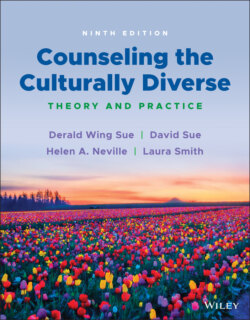Читать книгу Counseling the Culturally Diverse - Laura Smith L. - Страница 46
BALANCING THE CULTURE‐SPECIFIC AND CULTURE‐UNIVERSAL ORIENTATIONS
ОглавлениеThroughout our analysis of Dr. D., we have made the point that culture and life experiences affect the expression of abnormal behavior and that counselors need to attune to these sociodemographic variables. Some have even proposed the use of culture‐specific strategies in counseling and therapy (American Psychological Association, 2017; Ivey et al., 2014; Parham, Ajamu, & White, 2011). Such professionals point out that current guidelines and standards of clinical practice are culture‐bound and often inappropriate for clients of color and other minoritized individuals. Which view is correct? Should treatment approaches be based on cultural universality or cultural relativism? Few mental health professionals today embrace the extremes of either position.
Proponents of cultural universality focus on disorders and their consequent treatments and minimize cultural factors, whereas proponents of cultural relativism focus on the culture and on how the disorder is manifested and treated within it. Both views have validity. It would be naive to believe that no disorders cut across different cultures or share universal characteristics. Likewise, it is naive to believe that the relative frequencies and manners of symptom formation for various disorders do not reflect the dominant cultural values and lifestyles of a society. Nor would it be beyond our scope to entertain the notion that various diverse groups may respond better to culture‐specific therapeutic strategies. A more fruitful approach to these opposing views might be to address the following question: Are there ways to both examine the universality of the human condition and acknowledge the role of culture in the manifestation of both the presenting concern and the treatment approach? Recently, researchers have systematically addressed the question. Mounting evidence supports the superiority of culturally adaptive treatment interventions compared to culturally universal ones (Hall, Ibaraki, Huang, Marti, & Stice, 2016; Hall, Berkman, Zane et al., 2021).
